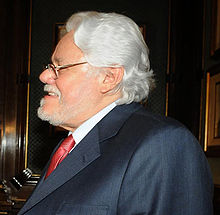Carlos Gaviria Díaz
Carlos Gaviria Díaz (born May 8, 1937 in Sopetrán , Antioquia , † March 31, 2015 in Bogotá ) was a Colombian lawyer , constitutional judge and politician .
As a presidential candidate, Gaviria achieved on May 28, 2006 with 2,600,000 votes (i.e. 22.04%) the best election result for a left-wing party in Colombia. On August 1, 2006 Gaviria was elected chairman of the Polo Democrático Alternativo (PDA) party. He hoped to make his party the leading opposition force during President Álvaro Uribe's second term .
education
Gaviria studied law at the University of Antioquia , where he earned a bachelor's degree in 1961 and a doctorate in law and political science in 1965 . On a scholarship, he was able to attend lectures in the fields of legal philosophy , constitutional law and political theory at Harvard University , where he obtained a Master of Arts degree in 1971. He taught at his home university, was dean of the law faculty from 1967 to 1969 and headed the department for public law from 1974 to 1980. One of his former students was his later political opponent Álvaro Uribe Vélez .
In 1980 Gaviria took over the vice-presidency of a committee for the protection of human rights in Medellín . His work made him a target for paramilitary forces. He received death threats and went into exile in Argentina. He returned in 1988 to resume his work at the University of Antioquia. From 1989 to 1992 he was deputy rector there.
Political career
In 1992 Gaviria was appointed constitutional judge by the Colombian Senate . He took office on March 1, 1993 and was elected chairman of the Colombian Constitutional Court three years later. He ended his eight-year term in 2001 and was elected senator in 2002 as a representative of the left-wing party alliance Frente Social y Politico with the fifth best result of the candidates .
After winning the nomination against Antonio Navarro Wolff , he stood in the Colombian presidential election in 2006 as a candidate for the Polo Democrático Alternativo party . Polls towards the end of April 2006 showed Gaviria in second place behind then President Álvaro Uribe Vélez, d. H. before Horacio Serpa Uribe of the Liberals , who ran for the third time in a row. Gaviria lost to incumbent Uribe in the May 2006 elections with 22% of the vote against Uribe's 62%.
Political concern
One of his political concerns was to change the socio-economic system of Colombia, which he believed displayed some of the worst features of capitalism , both on the global and local levels. Gaviria hoped that this would reduce the gap between rich and poor.
Gaviria and many of his supporters argued that this gap has widened over the past decade and is still growing, particularly as a result of the economic dictates of President Álvaro Uribe's government. Gaviria objected to measures that he believed aimed to make local and foreign investment more attractive at the expense of the working class, while increasing indirect taxes for the poor and lowering income taxes for the wealthy.
Gaviria was also a strong advocate of Colombia's 1991 constitution , but believed the need to better implement the chapters on human, ethnic and political rights while restoring control that he believed the state or government over the economy and should have company.
Web links
Individual evidence
- ^ Fallce el constitucionalista Carlos Gaviria a sus 77 años
- ↑ Oficina de Prensa: Carlos Gaviria, nuevo presidente del Polo ( Spanish ) Polodemocratico.net. August 1, 2006. Archived from the original on September 27, 2007. Info: The archive link was automatically inserted and not yet checked. Please check the original and archive link according to the instructions and then remove this notice. Retrieved July 6, 2010.
| personal data | |
|---|---|
| SURNAME | Gaviria Díaz, Carlos |
| BRIEF DESCRIPTION | Colombian lawyer, constitutional judge and politician |
| DATE OF BIRTH | May 8, 1937 |
| PLACE OF BIRTH | Sopetran , Antioquia |
| DATE OF DEATH | March 31, 2015 |
| Place of death | Bogotá |
